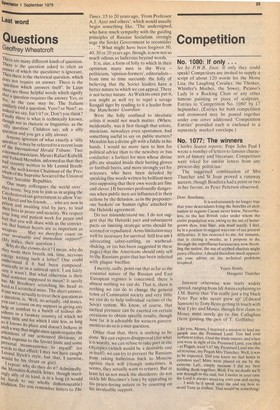Last word
Questions
Geoffrey Wheatcroft
There are many different kinds of question. There is the question asked to elicit an answer of which the questioner is ignorant. Then there is the rhetorical question, which does not require an answer, There is the 'question which answers itself'. In Latin there are those helpful words which signify ,tnat a question requires the answer Yes, or "10, as the case may be. The Italians similarly end a question. Vero? or Non?. as indeed we say, Isn't it? or. Don't you think .., rkinallY there is what is technically known. though not in rhetoric or linguistics, as the 'Silly question'. Children say, ask a silly question and you get a silly answer. Anyone ignorant of what exactly a `silly question, is may be referred to a recent issue of the International Herald Tribune. Two esteemed musicians. Messrs Rafael Kubelik and Yehudi Menuhin, informed us that they had recently written to Mr Leonid Brezhnev, the well-known Chairman of the Presidium of the Supreme Soviet of the Union oi S°viet Socialist Republics. 'Our many colleagues the world over'. they wrote, 'beg you to join us in urging the Czechoslovakian government to allow Vac lay Havel and his friends . . who are now in Prison and awaiting trial by jury. to lead their lives in peace and security. We respect Your long and patient work for peace and !eel that you will share with us the convict ion that human hearts are as important as weaPons . . . May we therefore count on Your invaluable and immediate support?' (My italics, their question.) Why do the clowns do it? I mean, why do they waste their breath, ink. time, nervous energy writing such a letter? One could understand if it had been composed. ironically or in a satirical spirit. I am fairly sure it wasn't. But what otherwise is their final sentence supposed to mean? It surely has Mr Brezhnev scratching his head as hard as I scratched mine. The short answer. ifone were actually to treat their question as a question. is. 'Well, no actually, old mates. you can't count on my support in giving any help or comfort to a bunch of tedious dissidents in a faraway country of which we know little and for which I care less, as long as it knows its place and doesn't behave in such a way that might once again require the attentions of our armoured divisions, at much expense to the Soviet State and some Personal inconvenience to myself' (or words to that effect: I may not have caught Leonid Ilyich's style, but that, I surmise, would be his thrust or gist). I repeat: why do they do it? Admittedly. the Menuhin-Kubelik letter, though startl ingly silly of its kind, is in a long (it would be harsh to say wholly dishonourable) tradition. Do you remember letters to The Times, 15 to 20 years ago. `From Professor A.J. Ayer and others'. which would usually begin something like, 'The undersigned, who have much sympathy with the guiding principles of Russian Socialism, strongly urge the Soviet Government to reconsider '? What might have been forgiven 50, 40.30 or 20 years ago, though, is now not so much odious as ludicrous beyond words.
It is. alas, a form of folly to which in their optimism many men in the West — politicians. 'opinion-formers', editorialists — from time to time succumb: the folly of believing that the Soviet leaders have a better nature to which we can appeal. There Is not' better nature. As Watkins once put it,. you might as well try to repel a savage Bengali tiger by reading to it a leader from the Manchester Guardian.
Were the folly confined to idealistic artists it would not much matter. (When. incidentally, was it first though that artists, musicians. nowadays even, sportsmen. had something Useful to say on public matters? Menuhin has a divine gift with a fiddle in his hands, I would no more turn to him for political advice than to the newsboy or bus conductor: a fortiori for men whose divine gifts are situated inside their batting gloves or football boots. and more strongly yet for actresses. who have been deluded by speaking fine words written by brilliant men into supposing that their own words are fine and clever.) It becomes profoundly dangerous when public men are influenced in their actions by the delusion. as in the preposterous 'baskets' on 'human rights' attached to the Helsinki agreement.
Do not misunderstand me. I do not suggest that the Helsinki pact and subsequent pacts on limiting strategic arms should be scorned or repudiated. Arms limitation may well be necessary for survival. Still less am I advocating sabre-rattling, or warheadshaking. or (as has been suggested in these pages) that the Americans should only sell to the Russians grain that has been infected with plague bacillus.
I merely. sadly. point out that as far as the essential nature of the Russian and East European regimes is concerned, there is almost nothing we can do. That is, there is nothing we can do to change the general tenor of Communist society and very little we can do to help individual victims of the Soviet system. We know, of course, that tactical pressure can be exerted on certain Occasions to obtain specific results, though how tar it is advisable for western governments to do so is a nice question.
Other than that, there is nothing to be done. We can express disapproval ( for what ills worth), we can refuse to take part in the Olympics (which would be a desirable end tri itself), we can try to prevent the Russians from taking ballerinas back to Moscow against their will (though sometimes, it seems, they actually want to return). But at least let us not mock the dissidents: do not tickle Mr Brezhnev's fancy by appealing to his peace-loving nature or by counting On his invaluable support.






























 Previous page
Previous page